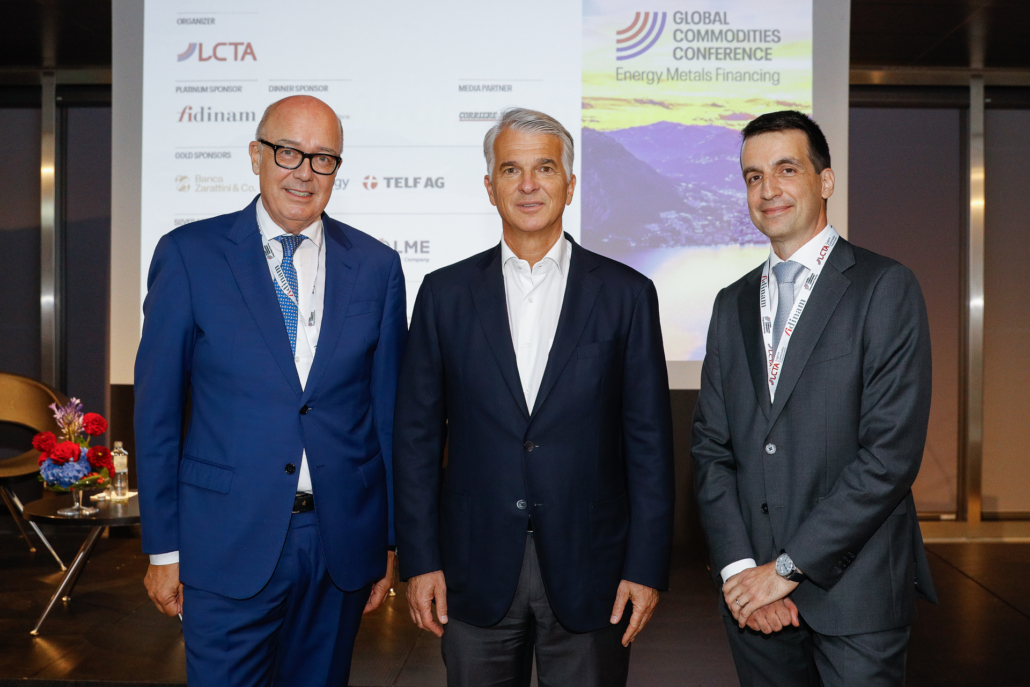Global Commodities Conference 2025: A Retrospective

The 2025 edition of the Global Commodities Conference – the flagship event of the Lugano Commodity Trading Association (LCTA) – took place on June 23 and 24 at the iconic LAC Lugano. Over 200 industry leaders and professionals gathered for two dynamic days of insightful discussions exploring the shifting geopolitical landscape and its profound impact on financial markets and commodities trading.
This year’s conference was proudly supported by a distinguished lineup of sponsors: Fidinam Group Holding as Platinum Sponsor; Axion SWISS Bank as Dinner Sponsor; Gold Sponsors Banca Zarattini, Sirius Energy and Telf; and Silver Sponsors Cornèr Banca, Filhet-Allard Maritime and London Metal Exchange. Held under the patronage of the City of Lugano and bolstered by institutional partners including the Ticino Chamber of Commerce and Industry (Cc-Ti), SUISSENÉGOCE, and the Zug Commodity Association, the event was also amplified through a media partnership with Corriere del Ticino.
Certified Commodity Trading Specialist Diploma Ceremony
The conference opened with the diploma ceremony for the second cohort of the Certified Commodity Trading Specialist program, which concluded in January 2025. Fifteen of the seventeen graduates were recognized on stage by LCTA President Matteo Somaini and Cristina Campana of Alma Impact: Zoran Anastasov, Brando Berti, Andrea Crespi Bel’skij, Andrea Brambilla, Gabriella D’Aleo, Ievgeniia Dmukh, Alessio Figliolia, William Kucera, Svitlana Lomatschinsky, Riccardo Maffi, Lorenza Michelini, Stefano Negri, Kaveh Nicjoo, Massimiliano Zanetti, and Ilenia Zendri (absent: Raùl Blanco Cañeque and Meltem Meshur).
Alessio Figliolia received the Best Student Award from Alma Impact’s co-founder and President, Alberto Stival.
Fireside Chat with Sergio Ermotti
A standout moment was the fireside chat with Sergio P. Ermotti, Group CEO of UBS. Mr. Ermotti engaged with LCTA Vice-President Roberto Grassi and the audience on pressing topics including the global economic outlook and the ongoing integration of Credit Suisse, which is progressing well. Outside of Switzerland, the vast majority of clients have already transferred and, by the end of first quarter of 2026, clients in Switzerland will also have migrated.
Mr. Ermotti noted the remarkable resilience of financial markets despite geopolitical shocks, saying markets were surprisingly calm given recent events. Addressing the alleged dollar crisis, he emphasized the absence of viable alternatives due to structural and political constraints in other major currencies and capital markets.
On trade, Mr. Ermotti expressed cautious optimism about future agreements between the U.S., Europe (including Switzerland), and other regions, predicting a shift toward regionalism rather than a full-scale deglobalization, which he emphasized would lead to a severe contraction of global economies. He also reaffirmed UBS’s stance on the Federal Council’s proposed updates to the “too big to fail” banking regulations, cautioning that increased capital requirements raise costs and constrain lending, and underscoring that trust remains the core capital of banking.
Geopolitical Complexity and Industry Resilience
LCTA President Matteo Somaini welcomed attendees to the second day of the Global Commodity Conference 2025, acknowledging the need for trading companies to adapt their business model to the protectionism, to the uncertainty and to a fragmented global landscape while key partners, like banks, are facing their challenges and adjust at different paces.
He welcomed the diverse group of experts and emphasized the growing strategic relevance of Middle Eastern economies. He also pointed to Europe’s limited relevance in current global discussions. Finally, he acknowledged the recent geopolitical upheavals, emphasizing the unforeseen importance of these discussions today.
China and the Global Economy
In a compelling keynote, Professor Keyu Jin (HKUST Business School and Harvard) explored China’s shifting position in the global economy. Amid ongoing trade fragmentation and U.S.-China tensions, she described China as pursuing a strategy of recalibration—enhancing its self-reliance while remaining selectively open to global markets.
Jin noted that while China continues to protect its economic framework and political independence, it is also gradually opening sectors such as finance and services to private initiatives. Domestically, she acknowledged significant structural challenges, including a struggling real estate sector, low consumption, and regional disparities, but highlighted the dynamism of the younger, globally engaged generation as a potential catalyst for change.
Regarding technology, Jin observed that external restrictions—such as U.S. export controls—have spurred a stronger national focus on innovation, with China now aiming for leadership in emerging industries.
Her message underscored that China’s path is one of measured transformation, designed to manage disruptions, redefine trade patterns, and advance its technological development.
Geopolitical Shockwaves and Strategic Uncertainty: A World on the Edge
In her keynote, Emily Harding (Center for Strategic and International Studies, CSIS) reflected on recent geopolitical disruptions—including events in Iran and shifting global alliances—as signs of a broader shift in the international order.
She described how key powers like Russia, China, and the U.S. are increasingly shaping global dynamics through forceful, transactional approaches. U.S. policy under Trump, she noted, is marked by strategic decoupling from China in critical sectors, driven by efforts to bolster national resilience and reduce dependency. This approach is part of a broader populist doctrine that emphasizes economic sovereignty, challenges multilateral frameworks, and relies on strong domestic appeal.
Harding also addressed the internal pressures facing the U.S.—from inflation and inequality to institutional mistrust—alongside the accelerating impact of technologies like AI and biotechnology.
She concluded on a cautiously optimistic note, suggesting that while political volatility remains, technological innovation and a desire for stability among business leaders could help steer the system forward—if governance can keep pace.
The Certainty of Uncertainty: the Turbulent Future of Global Politics and Economics
In his keynote, economist and author Alan Friedman described the current geopolitical and economic climate as marked by persistent uncertainty, fueled by unpredictable leadership, volatile policies, and the global rise of populism.
He characterized President Trump’s approach to foreign and economic policy as protectionist and erratic, raising concerns about the impact of trade tariffs on global stability. In contrast, he noted China’s more deliberate, long-term strategy, particularly in its handling of international relations and economic planning.
Friedman pointed to increasing fragmentation in global politics, including closer ties among authoritarian regimes and growing political unrest in the U.S. He warned of the risks of deglobalization, shifting trade dynamics, and questions over the long-term strength of the U.S. dollar, while suggesting that Europe could emerge as a more attractive investment destination.
Closing his remarks, Friedman drew historical parallels with the interwar period, cautioning that today’s wave of populism and polarization could pose serious challenges to democratic institutions and global stability. He urged continued vigilance in navigating an increasingly unpredictable world.
Experts’ Roundtable: Energy, U.S.-China Rivalry, and AI
Moderated by James May (DITH), the panel discussion brought together Emily Harding (CSIS), Alan Friedman, Mattia Giussani (Sirius Energy), and Nikolai Litvinenko (Telf) tackled the pressing issues shaping today’s geopolitical and economic landscape.
The discussion began with Europe’s efforts to enhance energy independence in response to global disruptions, with panelists emphasizing the role of renewables and innovation in ensuring long-term energy security.
Attention then turned to the strategic competition between the U.S. and China, particularly in the context of manufacturing and control over renewable energy supply chains. While the challenges are considerable, the panel agreed that targeted investment and policy reform could help the U.S. strengthen its position.
Artificial intelligence featured prominently, with debate on its disruptive potential in sectors like energy and finance, the need for stronger cybersecurity, and concerns about its misuse in conflict scenarios. The session concluded with a shared call for greater international cooperation and diplomatic engagement as essential means to navigate uncertainty and support global stability.


